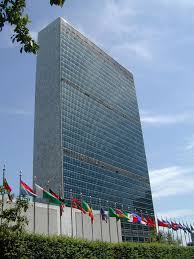NOTE: This guest post was written by Angelo Piro, one of the School of Diplomacy’s UN Youth Representatives. Angelo is a student majoring in Diplomacy and International Relations and Economics at Seton Hall University. Angelo’s focus has been on the role of international organizations in development and good governance. He is fluent in English and Spanish, and has a working knowledge of Russian. Angelo has studied at Dubrovnik International University in Dubrovnik, Croatia, and has interned with the Permanent Mission of Honduras to the United Nations and the Office of US Senator Kirsten Gillibrand (D-NY). He writes for the Diplomatic Envoy, and is a member of the Seton Hall United Nations Association.
On February 5, Anthony Banbury, a senior UN official and then Assistant Secretary General for Field Support, resigned his post from the United Nations. This did not raise many eyebrows at the UN or among many observers of the organization, that is until Banbury took to the New York Times op ed page and published a scathing review of the United Nations titled “I Love the UN, but It Is Failing”.
Banbury is a well-known UN official, with deep ties to the organization, having begun his career in the 1990’s and having recently served as the head of the UN’s Ebola response, making his criticisms of his one-time home even more concerning. Central to his critique of the United Nations is that it is severely mismanaged. In recalling his first experiences as Assistant Secretary General, Banbury describes having to battle against “the blur of Orwellian admonitions and Carrollian logic that govern” the UN and describes it as “a black hole into which disappear countless tax dollars and human aspirations, never to be seen again”. This is a scary assessment from someone who held such a high rank within the organization. In order to see the UN achieve its full potential, Banbury sees a need to improve three things:
Improved Personnel Systems
One of the biggest challenges that Banbury came up against is the rigid and complete system with which the UN hires and deploys its personnel around the world. Banbury points out that it takes on average 213 days to recruit and deploy an employee of the UN, with new systems in place that are likely to increase that. Banbury showed how detrimental this can be when recounting his experience of having to skirt the rules in order to effectively hire the staff he needed during the response to Ebola. When facing such large and evolving crises, flexibility and speed are necessary, which are two things lacking in the current administration of the UN.
The problem does not stop with the hiring process. Banbury also points out that it is nearly impossible to relieve a UN official of duty due to incompetence, even admitting that there is a current chief of staff of a peacekeeping mission that many have been trying to remove. Luckily, there has been some movement on this issue, such as the passage of a recent Security Council Resolution that gives the Secretary General more flexibility in removing and reassigning peacekeeping staff accused of disciplinary violations. But more improvements need to be made.
Unclear Missions
One of the worst failings for Banbury was the unclear mission that many UN operations have. For Banbury, many operations haven’t moved beyond trying to do the right thing, and haven’t focused on the actual underlying issues that cause the problems they are trying to stop. He looks to Haiti as an example, which hasn’t had armed conflict in years, yet still has a highly expensive UN peacekeeping presence that has done little to improve the political or economic situation that plagues the island nation now that the violence has passed. Banbury views this as a missed opportunity. Other missions continue to blunder, and unless the UN readjusts its focus and priorities, Banbury says that it will continue to waste billions and not fix anything.
Wasted Resources
For an organization trying to spread its limited dollars around the world, the UN is rife with wasted money and resources, according to Banbury. In examining the current MINUSCO peacekeeping force in Mali, he found that over eighty percent of the expenses for the mission were going towards self-protection or logistics, while the original point of the mission languishes with the adequate resources to accomplish it. Banbury finds similar waste in different headquarters offices. Banbury calls for the capping of administrative costs compared to operations, as well as a devolution of budget allocation from the Department of Management to the Secretary General’s office itself.
Overall, Banbury is not against the UN itself. He still believes in its mission and ability to do incredible good. However, on its 70th birthday, the UN needs to evolve to meet the needs of the new world. To use the words of Banbury himself, the UN needs to stop being “a Remington typewriter in a smartphone world”. He calls on all members and interested observers to take the upcoming election of a new Secretary General to reevaluate the direction of the UN and make sure it fulfills its promise to the world for the next seventy years.
